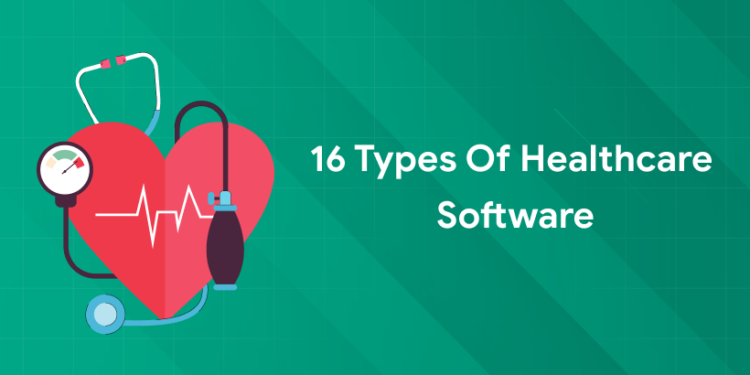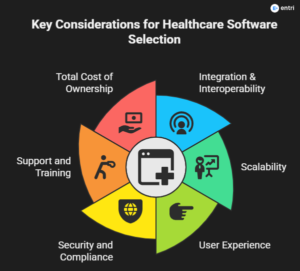Table of Contents
Key Takeaways:
- Healthcare software in India is rapidly expanding, driven by rising cloud adoption, AI integration, and telemedicine growth.
- India’s healthcare cloud computing market is set to grow to $20.23 billion by 2034, reflecting widespread digital transformation.
- Telemedicine in India is booming, expected to reach $5.5 billion in 2025, improving access to remote and rural populations.
- Data security remains a critical challenge, with Indian healthcare institutions facing significant breaches—making compliance and cybersecurity non-negotiable.
- Entri’s Hospital Administration Course equips learners with practical skills in leading software like Ellider, preparing professionals for India’s evolving healthcare landscape.
Introduction: Why Healthcare Software Is Redefining Hospitals in 2025
Healthcare is changing fast. Digital platforms—from electronic health records (EHRs) to telemedicine software—are now the backbone of every hospital, clinic, and health tech startup. If you want to improve care, streamline operations, or boost compliance, choosing the best healthcare management software matters more than ever.
The widespread adoption of smart tools has helped reduce errors, save time, and improve the connection between clinicians and patients. Modern healthcare software isn’t just about storage; it’s about data-driven decision making, predictive analytics, and seamless interoperability. From appointment scheduling to population health analytics, the options are broader—and smarter.
What is Healthcare Management Software?
1: What is the primary role of a hospital administrator?
Healthcare management software refers to a broad spectrum of digital solutions designed to handle day-to-day operational, clinical, financial, and patient-service aspects of healthcare facilities. Whether you’re searching for HIPAA-compliant healthcare software, an affordable hospital management platform, or a telemedicine solution for multi-speciality clinics, the right system can revolutionize your practice.
Key Functions of Healthcare Management Software:
-
Patient Data Management: Stores and organizes clinical records—from medical histories to diagnostic images—facilitating accurate, secure, and swift data retrieval across departments.
-
Appointment and Scheduling: Automates booking, tracks doctors’ availability, sends reminders to reduce no-shows, and coordinates patient and resource schedules—all accessible via web or mobile interfaces.
-
Billing and Revenue Cycle Management: Streamlines claims processing, manages invoices, tracks payments, and ensures accurate and timely reimbursement for healthcare providers.
-
Compliance and Security: Ensures all operations adhere to healthcare regulations such as HIPAA, with features like data encryption, access control, and audit logs for patient privacy and legal protection.
-
Inventory and Equipment Monitoring: Prevents shortages or wastage by tracking drugs, medical supplies, and assets, generating alerts, and smoothening the procurement workflow.
-
Communication and Engagement: Provides portals and messaging tools for patient-provider interaction, feedback collection, and ongoing follow-up, leading to improved satisfaction and adherence.
Benefits of Healthcare Management Software:
-
Centralized Operations: Integrates multiple functions—patient records, billing, inventory, and HR—resulting in efficient workflows and improved collaboration among staff.
-
Better Patient Care: Quick access to patient information enables faster, more informed clinical decisions and personalized treatments.
-
Data-Driven Insights: Real-time dashboards and analytics help monitor outcomes, optimize resource usage, and assess population health trends for continuous improvement.
-
Scalability and Flexibility: Modular architecture allows facilities to add or reconfigure features as they grow, from small clinics to multi-speciality hospitals.
-
Remote Accessibility: Cloud-based platforms enable authorized users to manage records, appointments, and more from anywhere—crucial for telehealth and multi-location networks.
Popular Use Cases:
-
Small clinics use affordable practice management software to streamline daily appointments and billing.
-
Multi-speciality hospitals adopt integrated hospital management platforms for managing complex operations and large patient volumes.
-
Diagnostic labs implement cloud-based LIMS for accurate sample tracking and compliance.
-
Healthcare administrators enroll in skill-focused programs (like Entri’s Hospital Administration Course) to master top hospital software for daily operations.
People also read: Entri Hospital Administration Course – FAQs
In short, healthcare management software is the digital engine powering smarter, safer, and more efficient health services—helping providers focus on what matters most: excellent patient care.
Hospital Administration Course with Assured Career Growth
Hospital Administration Course by Entri App: Master essential healthcare management skills, gain certification, and secure top roles in leading hospitals
Join Now!16 Essential Types of Healthcare Software in 2025
1. Electronic Health Record (EHR) Software
-
Digitally centralizes patient information (medical history, tests, doctors’ notes).
-
Supports integrated billing, robust reporting, and cloud-based accessibility.
-
Advanced interoperability helps doctors coordinate care across specialties.
2. Practice Management Software
-
Streamlines appointment booking, staff schedules, patient data, and secure messaging.
-
Automates billing, compliance reminders, and reporting for clinics.
-
Customizable for different practices—dentistry, paediatrics, and outpatient clinics.
3. Telemedicine Software
-
Enables virtual consultations through secure video and chat modules.
-
Integrates e-prescriptions, patient portals, and digital payments.
-
Empowers remote care in rural areas and during emergencies.
4. Revenue Cycle Management (RCM) Software
-
Handles claims, billing, payment reminders, and denials with full audit trails.
-
Improves cash flow and financial transparency for hospitals.
-
Built-in compliance to prevent billing errors and delays.
5. Patient Engagement Software
-
Supports appointment reminders, satisfaction surveys, and digital follow-up.
-
Enables patient self-service—lab results, prescriptions, and scheduling.
-
Enhances experience, reduces no-shows, and encourages proactive health management.
6. Healthcare Analytics Software
-
Uses predictive AI to turn clinical and operational data into actionable insights.
-
Tracks trends like patient outcomes, disease patterns, and resource utilization.
-
Dashboards provide real-time analytics for management and clinicians.
7. Medical Inventory & Equipment Management Software
-
Monitors stock, tracks expiry, manages ordering of drugs and supplies.
-
Automated alerts help prevent shortages and overstocking.
-
IoT-enabled tools for real-time asset tracking and equipment maintenance.
8. Clinical Trial Management Software
-
Organizes study protocols, recruitment, compliance documentation.
-
Centralizes trial data for researchers and regulatory bodies.
-
Tracks milestones, reporting, and participant engagement.
9. Healthcare CRM Software
-
Coordinates communications (calls, emails, SMS), nurturing patient relationships.
-
Marketing automation for targeted outreach and retention campaigns.
-
Facilitates multi-team collaboration for continuity of care.
10. Hospital Information & Administration Software
-
Integrates patient records, billing, HR, inventory, and facility management.
-
Modular design adapts to hospitals, specialty centres, and large clinics.
-
Improves overall workflow and data accessibility.
11. Medical Imaging & Diagnostics Software
-
Handles MRI, CT, X-ray data management, 3D imaging, and PACS integration.
-
Boosts diagnostic accuracy with advanced visualization features.
-
Secure sharing with referring radiologists and specialists.
12. Appointment Scheduling Software
-
Web and mobile booking, automated reminders, and calendar sync.
-
Prevents double-booking, integrates with EHR and telemedicine systems.
-
Simplifies administration for both staff and patients.
13. Population Health Management Platforms
-
Aggregates data from multiple sources to assess community health trends.
-
Supports care coordination, risk stratification, and reporting.
-
Helps design targeted programs and interventions.
14. Behavioral & Mental Health Software
-
Tailored for therapy scheduling, progress documentation, and compliance.
-
Confidential client data and outcome tracking improve the quality of care.
-
Integrated with national standards for mental healthcare providers.
15. Compliance Management Software
-
Manages HIPAA, SOC2, and other regulatory tracking—audit logs and risk management.
-
Automatic updates for changing legal requirements.
-
User access management and system activity control.
16. Laboratory Information Management Systems (LIMS)
-
Tracks samples, test data, workflow, and compliance for diagnostics labs.
-
Supports multi-site operations, accuracy, and quick reporting.
-
Enables regulatory readiness and data security.
Tips for Choosing the Right Healthcare Software
Selecting the best healthcare management software for your hospital, clinic, or practice isn’t just about picking the most popular platform—it’s about finding a solution that meets your exact needs, fits your budget, and grows with your organization. Here’s how to make a smart, future-ready choice:
1. Prioritize Integration & Interoperability
-
Look for software that easily connects with your existing systems—EHRs, billing platforms, appointment schedulers, and diagnostic tools.
-
Choose platforms with open APIs or built-in integration features to avoid data silos and promote smooth workflows.
2. Plan for Scalability
-
Choose a solution that offers modular, customizable features. As your clinic or hospital grows, you may need additional modules for inventory, telemedicine, or advanced analytics.
-
Opt for cloud-based healthcare software that supports remote access and multiple locations—ideal for multi-speciality hospitals and expanding practices.
3. Focus on User Experience
-
Select platforms with an intuitive, easy-to-learn interface; complicated systems can lead to staff frustration and poor adoption.
-
Ask for free demos or trial periods to let your team evaluate usability before committing.
4. Ensure Security and Compliance
-
Make HIPAA compliance non-negotiable—security features like encryption, audit trails, and multi-factor authentication protect patient privacy and meet legal requirements.
-
Check for regular software updates and compliance certifications to stay ahead of changing data security laws.
5. Assess Support and Training
-
Invest in software backed by responsive customer support and comprehensive training resources.
-
Consider software providers who offer onboarding services or ongoing help—this minimizes disruptions and ensures your team is ready from day one.
6. Evaluate Total Cost of Ownership
-
Factor in not just purchase price, but ongoing costs for upgrades, training, maintenance, and integrations with other hospital software platforms.
-
Look for value in reduced errors, saved staff hours, and improved patient outcomes—these benefits quickly outweigh initial investments.
Pro Tip: When in doubt, consult with your clinicians and administrative staff—they’ll highlight practical challenges and must-have features you might overlook.
Comparison Table: Top Healthcare Software Solutions in 2025
Choosing the right healthcare software can be daunting, given the variety of options available. To simplify your decision-making, here’s a clear comparison of some of the leading platforms across key types of healthcare software. This table highlights essential features, ideal use cases, and approximate pricing models, giving you a snapshot of options to consider for your facility.
| Software Type | Popular Platforms | Key Features | Ideal For | Pricing Model |
|---|---|---|---|---|
| Electronic Health Record (EHR) | Epic Systems, Cerner, eClinicalWorks | Comprehensive patient records, billing, and interoperability | Large hospitals, multispecialty | Subscription-based; enterprise pricing |
| Practice Management Software | Blaze.tech, Kareo, Athenahealth | Appointment booking, billing automation, and compliance tools | Small to medium clinics | Monthly subscription; scalable plans |
| Telemedicine Software | Doxy.me, Teladoc, Amwell | Secure video consultations, patient portals, e-prescriptions | Rural clinics, remote care providers | Per provider or consult pricing |
| Medical Billing & RCM | Tebra, AdvancedMD, Epic Care | Automated claims processing, denial management, and payments | Private practices, hospitals | Percentage of collections or subscriptions |
| Healthcare Analytics | Tableau, Qlik, Health Catalyst | Predictive analytics, dashboards, population health tracking | Healthcare networks, insurers | License-based; customizable |
| Medical Inventory Management | eTurns, Sortly, Oracle SCM | Stock tracking, expiration alerts, and reordering automation | Hospitals, pharmacies, clinics | Subscription or license fee |
| Laboratory Information Systems (LIMS) | STARLIMS, LabWare, CloudLIMS | Sample tracking, data compliance, automated reporting | Diagnostic labs, research centers | Per user or lab site pricing |
Note: Pricing varies by region and deployment complexity. Always request a quote tailored to your organization’s size and needs.
Hospital Administration Course with Assured Career Growth
Hospital Administration Course by Entri App: Master essential healthcare management skills, gain certification, and secure top roles in leading hospitals
Join Now!Industry Trends & Future Outlook: What’s Shaping Healthcare Software in 2025 and Beyond?
The healthcare technology landscape is evolving rapidly, driven by innovation, changing patient needs, and new regulatory environments. As we look at 2025 and beyond, several key trends are influencing the development and adoption of healthcare software:
-
Artificial Intelligence (AI) and Machine Learning: AI-powered diagnostics, predictive analytics for patient outcomes, and automated administrative workflows are becoming mainstream. According to a report by MarketsandMarkets, the global AI in healthcare market is expected to reach $120 billion by 2025, growing at a CAGR of 41.5%.[1]
-
Remote Patient Monitoring and Telehealth Expansion: The adoption of remote monitoring devices—like wearable ECGs, glucose monitors, and blood pressure monitors—is accelerating. Telemedicine software is no longer optional but a core offering that expands access and reduces hospital burden.
-
Interoperability and Seamless Data Exchange: Healthcare providers demand software that can talk to other systems seamlessly. The push for universal standards, like FHIR (Fast Healthcare Interoperability Resources), is enabling smoother data flow between EHRs, labs, pharmacies, and insurers.
-
Cloud-Based and Mobile-First Solutions: Cloud computing ensures data accessibility, scalability, and cost efficiency. Mobile platforms empower clinicians and patients alike, delivering healthcare anywhere, anytime.
-
Patient-Centric Care and Engagement: Increasingly, software focuses on delivering personalized care, providing patients with portals for records, appointment management, and communication, which boosts satisfaction and adherence.
-
Regulatory Compliance and Data Security: Heightened emphasis on HIPAA, GDPR, and emerging regulations means software must include advanced security features and compliance tools, as breaches can lead to expensive penalties.
These trends reflect a broader shift towards value-based care, operational efficiency, and technology-enabled patient empowerment, ensuring healthcare software remains a critical investment for every institution.
Also read: Hospital Administration Career Opportunities Abroad
Common Pitfalls and Mistakes to Avoid When Choosing Healthcare Software
Despite the exciting possibilities, healthcare organizations often encounter avoidable challenges in the software selection and implementation process. Knowing these common pitfalls helps you sidestep costly errors and achieve smoother adoption:
-
Ignoring User Experience (UX): Choosing software based on features alone without considering staff usability can lead to low adoption. Complex interfaces or long learning curves frustrate clinicians and administrators.
-
Overlooking Integration Needs: Failing to ensure interoperability with existing systems results in data silos, duplicated work, and disrupted workflows. Indian hospitals and digital health platforms have experienced a series of data breaches—including high-profile incidents at Apollo Hospitals and AIIMS Delhi—highlighting the urgency of robust cybersecurity in healthcare IT. [2]
-
Neglecting Scalability: Selecting software that doesn’t grow with your organization leads to costly replacements or painful upgrades as demand increases.
-
Underestimating Total Cost of Ownership: Focusing only on upfront costs overlooks expenses related to training, maintenance, customization, and integration.
-
Ignoring Compliance and Security Requirements: Implementing software without up-to-date compliance certifications risks legal issues and damages patient trust.
-
Skipping Vendor Due Diligence: Not thoroughly vetting vendor reputation, customer support, and update policies can cause operational disruptions.
-
Poor Change Management: Lack of staff training and communication during implementation can lead to resistance, errors, and workflow breakdown.
-
Failure to Plan for Data Migration: Neglecting a detailed migration plan from legacy systems can cause data loss or corruption.
-
Not Setting Clear Goals: Without measurable objectives, it’s difficult to evaluate software effectiveness or ROI after deployment.
Avoiding these pitfalls is critical for maximizing the benefits of healthcare software investments and ensuring patient care improvements.
Fact: According to a 2024 KPMG survey, 63% of healthcare software implementations faced delays or budget overruns due to scope creep and inadequate planning. [3]
Conclusion: The Future Starts with You
Digital transformation in healthcare isn’t a distant promise—it’s happening right now, and organizations that act fast gain a true edge in patient care and operational excellence. From appointment scheduling to analytics, healthcare management software empowers you to make smarter decisions, deliver better outcomes, and create happier work environments.
Investing in the right tools means less time worrying about paperwork and compliance, and more time focusing on patient well-being. It means being ready for everything from telemedicine expansion to new government regulations and emerging diseases.
Entri’s Hospital Administration Course in Kerala is your gateway to mastering these tools and trends. With a curriculum built by experts, hands-on software training—including Ellider and other leading platforms—and links to real-world healthcare challenges, you’ll be prepared to excel in the field and reshape the future of hospital management in India.
Also read: What is Elllider Software?
Ready to drive positive change and future-proof your career? Don’t just watch the healthcare revolution—lead it. Explore Entri’s Hospital Administration Course, unlock powerful new skills, and become a trusted professional in tomorrow’s hospitals and clinics.
Enrol today and let your journey towards impactful, tech-driven healthcare leadership begin!
Hospital Administration Course with Assured Career Growth
Hospital Administration Course by Entri App: Master essential healthcare management skills, gain certification, and secure top roles in leading hospitals
Join Now!Frequently Asked Questions
What is healthcare management software in the Indian context?
Healthcare management software in India comprises digital tools designed to streamline hospital administration, patient records, billing, and telemedicine services, addressing the unique challenges of a diverse and populous healthcare market.
How fast is healthcare software adoption growing in India?
India’s healthcare cloud computing market is projected to grow at a CAGR of over 20%, reaching $20.23 billion by 2034, while the telemedicine segment alone is expected to hit $5.5 billion by 2025.
How secure is healthcare data in Indian hospitals?
While advances in IT improve care, India’s healthcare sector is vulnerable to data breaches. High-profile incidents have exposed millions of patient records, prompting increased focus on HIPAA-like compliance, data encryption, and cybersecurity.
What are the best healthcare software solutions used in India?
Popular solutions include large-scale EHR providers like Epic and Cerner, Indian platforms such as Ellider Hospital Software, and telemedicine platforms tailored for rural connectivity. Customizable practice management and billing solutions are also widely adopted.
How can Entri’s Hospital Administration Course help Indian healthcare professionals?
Entri’s course offers practical training on cutting-edge hospital software and digital workflows tailored for the Indian market, enhancing career readiness in administration, operations, and technology adoption.
Is telemedicine widely accepted in India?
Yes, telemedicine has rapidly grown, supported by government initiatives and increased smartphone penetration, making healthcare more accessible in rural and underserved regions.

















